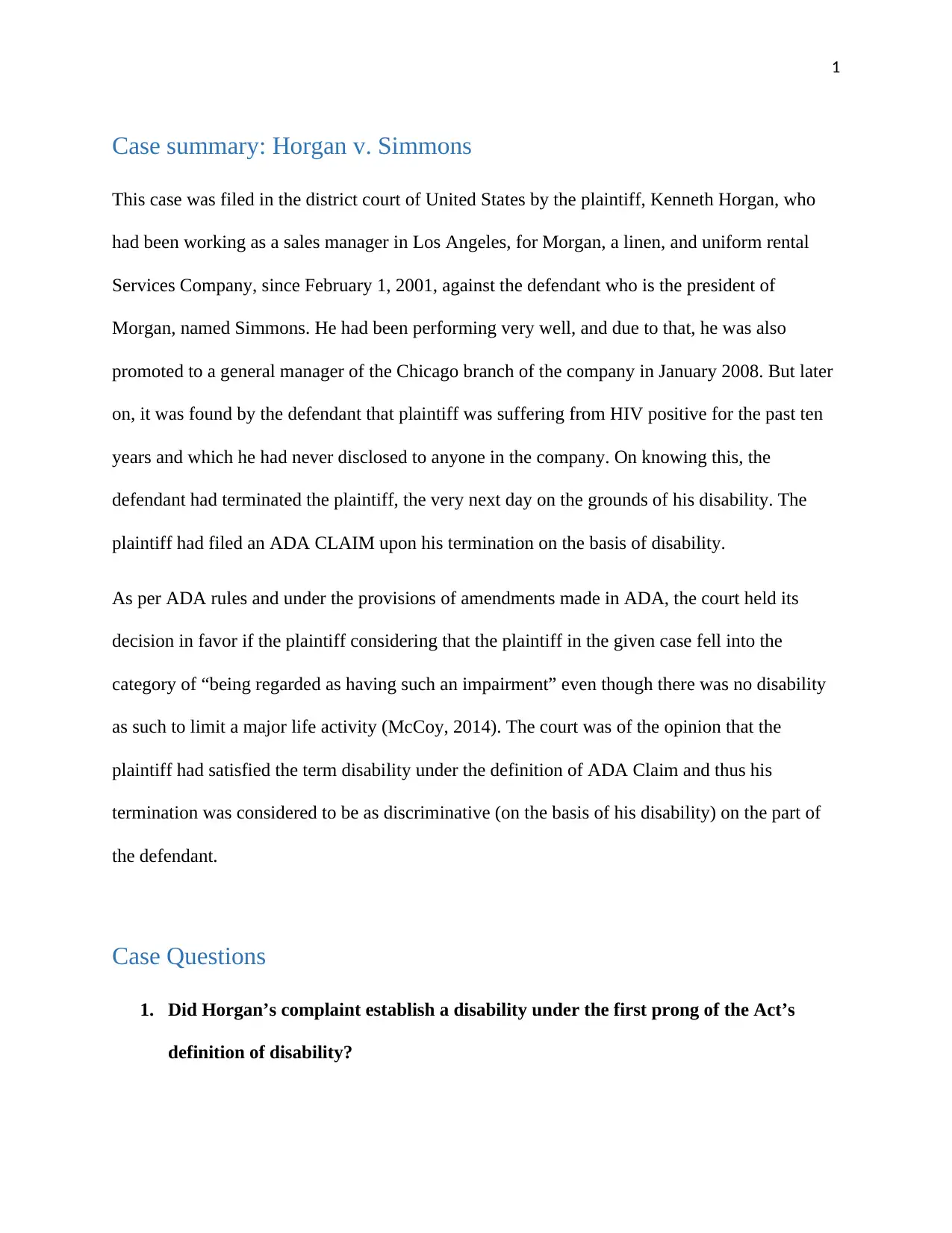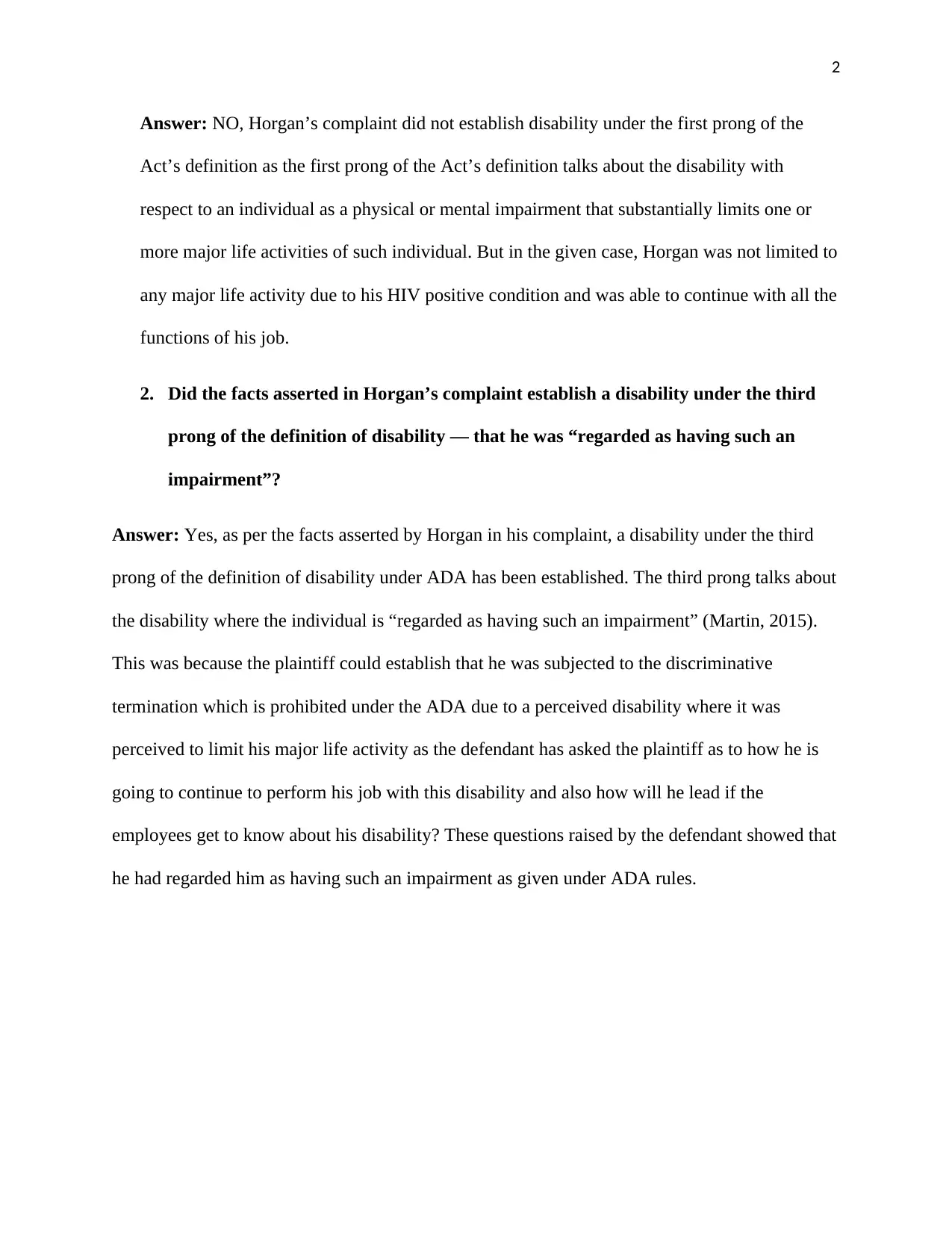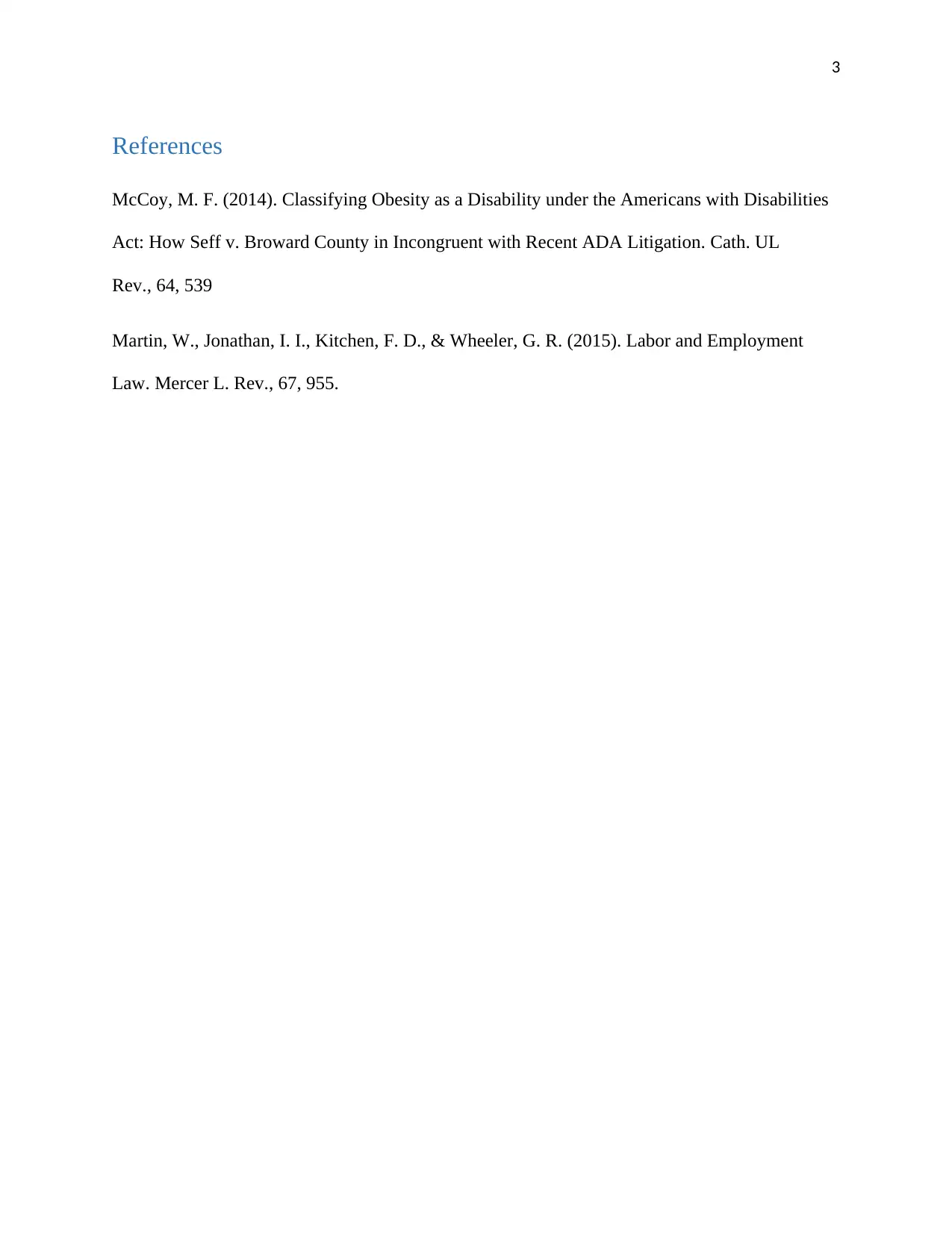Horgan v. Simmons Case Analysis
VerifiedAdded on 2019/09/18
|4
|679
|100
Case Study
AI Summary
This document presents a case study analysis of Horgan v. Simmons, a legal case involving an ADA claim. The plaintiff, Kenneth Horgan, was terminated from his job after his employer discovered he was HIV positive. The analysis examines whether Horgan's complaint established a disability under the first and third prongs of the ADA definition. The study concludes that while Horgan did not meet the criteria for disability under the first prong, he did meet the criteria under the third prong, as he was 'regarded as having such an impairment' by his employer. The document also includes references to relevant legal articles.

Horgan v. Simmons
Patrick Francis, HRMG 5700, Webster University. Spring 2
Patrick Francis, HRMG 5700, Webster University. Spring 2
Paraphrase This Document
Need a fresh take? Get an instant paraphrase of this document with our AI Paraphraser

1
Case summary: Horgan v. Simmons
This case was filed in the district court of United States by the plaintiff, Kenneth Horgan, who
had been working as a sales manager in Los Angeles, for Morgan, a linen, and uniform rental
Services Company, since February 1, 2001, against the defendant who is the president of
Morgan, named Simmons. He had been performing very well, and due to that, he was also
promoted to a general manager of the Chicago branch of the company in January 2008. But later
on, it was found by the defendant that plaintiff was suffering from HIV positive for the past ten
years and which he had never disclosed to anyone in the company. On knowing this, the
defendant had terminated the plaintiff, the very next day on the grounds of his disability. The
plaintiff had filed an ADA CLAIM upon his termination on the basis of disability.
As per ADA rules and under the provisions of amendments made in ADA, the court held its
decision in favor if the plaintiff considering that the plaintiff in the given case fell into the
category of “being regarded as having such an impairment” even though there was no disability
as such to limit a major life activity (McCoy, 2014). The court was of the opinion that the
plaintiff had satisfied the term disability under the definition of ADA Claim and thus his
termination was considered to be as discriminative (on the basis of his disability) on the part of
the defendant.
Case Questions
1. Did Horgan’s complaint establish a disability under the first prong of the Act’s
definition of disability?
Case summary: Horgan v. Simmons
This case was filed in the district court of United States by the plaintiff, Kenneth Horgan, who
had been working as a sales manager in Los Angeles, for Morgan, a linen, and uniform rental
Services Company, since February 1, 2001, against the defendant who is the president of
Morgan, named Simmons. He had been performing very well, and due to that, he was also
promoted to a general manager of the Chicago branch of the company in January 2008. But later
on, it was found by the defendant that plaintiff was suffering from HIV positive for the past ten
years and which he had never disclosed to anyone in the company. On knowing this, the
defendant had terminated the plaintiff, the very next day on the grounds of his disability. The
plaintiff had filed an ADA CLAIM upon his termination on the basis of disability.
As per ADA rules and under the provisions of amendments made in ADA, the court held its
decision in favor if the plaintiff considering that the plaintiff in the given case fell into the
category of “being regarded as having such an impairment” even though there was no disability
as such to limit a major life activity (McCoy, 2014). The court was of the opinion that the
plaintiff had satisfied the term disability under the definition of ADA Claim and thus his
termination was considered to be as discriminative (on the basis of his disability) on the part of
the defendant.
Case Questions
1. Did Horgan’s complaint establish a disability under the first prong of the Act’s
definition of disability?

2
Answer: NO, Horgan’s complaint did not establish disability under the first prong of the
Act’s definition as the first prong of the Act’s definition talks about the disability with
respect to an individual as a physical or mental impairment that substantially limits one or
more major life activities of such individual. But in the given case, Horgan was not limited to
any major life activity due to his HIV positive condition and was able to continue with all the
functions of his job.
2. Did the facts asserted in Horgan’s complaint establish a disability under the third
prong of the definition of disability — that he was “regarded as having such an
impairment”?
Answer: Yes, as per the facts asserted by Horgan in his complaint, a disability under the third
prong of the definition of disability under ADA has been established. The third prong talks about
the disability where the individual is “regarded as having such an impairment” (Martin, 2015).
This was because the plaintiff could establish that he was subjected to the discriminative
termination which is prohibited under the ADA due to a perceived disability where it was
perceived to limit his major life activity as the defendant has asked the plaintiff as to how he is
going to continue to perform his job with this disability and also how will he lead if the
employees get to know about his disability? These questions raised by the defendant showed that
he had regarded him as having such an impairment as given under ADA rules.
Answer: NO, Horgan’s complaint did not establish disability under the first prong of the
Act’s definition as the first prong of the Act’s definition talks about the disability with
respect to an individual as a physical or mental impairment that substantially limits one or
more major life activities of such individual. But in the given case, Horgan was not limited to
any major life activity due to his HIV positive condition and was able to continue with all the
functions of his job.
2. Did the facts asserted in Horgan’s complaint establish a disability under the third
prong of the definition of disability — that he was “regarded as having such an
impairment”?
Answer: Yes, as per the facts asserted by Horgan in his complaint, a disability under the third
prong of the definition of disability under ADA has been established. The third prong talks about
the disability where the individual is “regarded as having such an impairment” (Martin, 2015).
This was because the plaintiff could establish that he was subjected to the discriminative
termination which is prohibited under the ADA due to a perceived disability where it was
perceived to limit his major life activity as the defendant has asked the plaintiff as to how he is
going to continue to perform his job with this disability and also how will he lead if the
employees get to know about his disability? These questions raised by the defendant showed that
he had regarded him as having such an impairment as given under ADA rules.
⊘ This is a preview!⊘
Do you want full access?
Subscribe today to unlock all pages.

Trusted by 1+ million students worldwide

3
References
McCoy, M. F. (2014). Classifying Obesity as a Disability under the Americans with Disabilities
Act: How Seff v. Broward County in Incongruent with Recent ADA Litigation. Cath. UL
Rev., 64, 539
Martin, W., Jonathan, I. I., Kitchen, F. D., & Wheeler, G. R. (2015). Labor and Employment
Law. Mercer L. Rev., 67, 955.
References
McCoy, M. F. (2014). Classifying Obesity as a Disability under the Americans with Disabilities
Act: How Seff v. Broward County in Incongruent with Recent ADA Litigation. Cath. UL
Rev., 64, 539
Martin, W., Jonathan, I. I., Kitchen, F. D., & Wheeler, G. R. (2015). Labor and Employment
Law. Mercer L. Rev., 67, 955.
1 out of 4
Related Documents
Your All-in-One AI-Powered Toolkit for Academic Success.
+13062052269
info@desklib.com
Available 24*7 on WhatsApp / Email
![[object Object]](/_next/static/media/star-bottom.7253800d.svg)
Unlock your academic potential
Copyright © 2020–2025 A2Z Services. All Rights Reserved. Developed and managed by ZUCOL.





